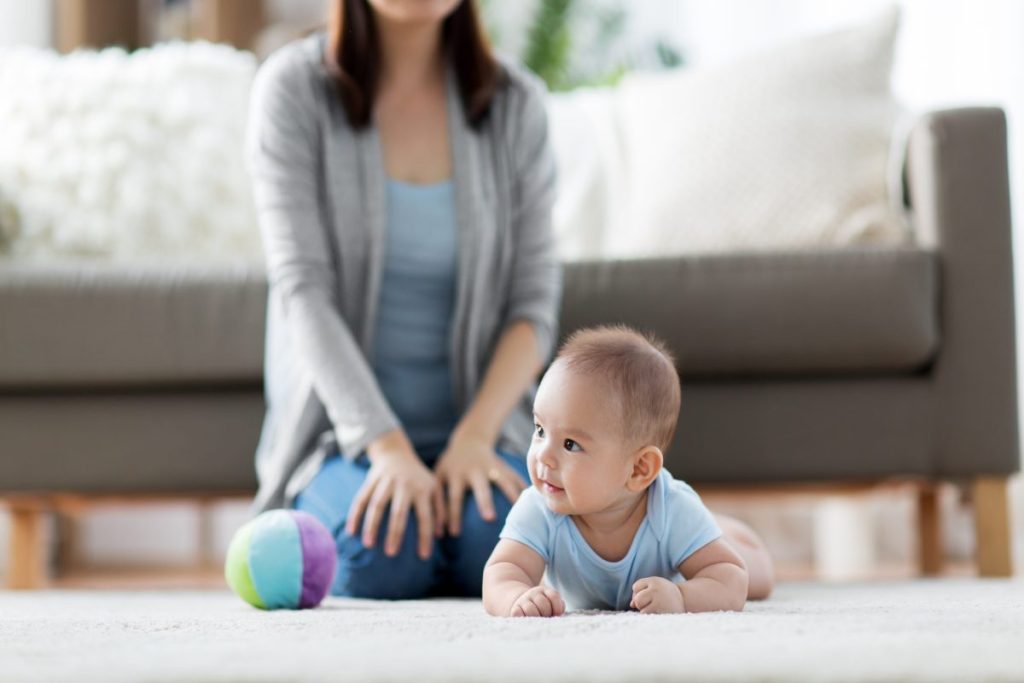As a new parent, you may have 101 questions about the safety and development of your new little one. One of those questions relating to both factors might be, when do babies roll over? What can a parent do to encourage this movement? And once they start rolling over, how can we keep them safe? Look no further for the answer because we have it right here, along with tips for getting babies on their way toward this exciting milestone.

When do babies start to roll over? Is there a specific age?
Somewhere around 4 months, babies typically start rocking back and forth from their backs to their sides. This motion sets the stage for rolling over. Also, you might notice that during this stage, your baby might begin lifting their chest, neck, and head with some help from their little arms. In some cases, babies might even roll over onto their backs accidentally from this position. This happens when they unintentionally shift their weight over to one side and land their backs.
Should this motion occur, don’t be surprised if your baby is somewhat startled. After all, they only wanted to pick their head up to get a better look at their surroundings. They weren’t expecting the whole room to rotate. In this situation, you’ll need to be ready to soothe your baby and give the reassurance that everything is OK.
Also, between the 4- and 5-month mark, babies may demonstrate motions that signal they’re ready to roll from tummy to back more often. And while it’s quite common for babies to roll from back to front at this age, some take a few weeks to reach this milestone.

When do you start tummy time on a regular basis?
One important safety tip to keep in mind regarding tummy time is to keep a close watch over your baby and to always put your little one to sleep on their back and not on their tummy. Keeping that in mind, newborns can start having tummy time right away. All you need to do is place your tiny tot on your chest or on your lap with the tummy down for a few minutes two or three times a day.
As the first few weeks go by, your baby might already try to lift their head. Plus, you might feel the tiny shove of little arms. This is perfectly normal because your child is strengthening the muscles in the neck, upper back, and shoulders.
As your babe gets older, you can place them on a blanket on the floor, tummy side down. While this position proves to be frustrating for baby at first, you only need to allow for about a minute or two, but during each tummy time session, you’ll gradually increase the time. To provide some encouragement, you can play with rattles or other toys that will get baby’s attention and promote reaching and moving forward. Basically, your goal is to reach about an hour of tummy time by 3 months of age. Remember, this exercise and playtime lead to the next milestone of rolling over as well as crawling.

What to do when baby tries to roll over (to keep them from hurting themselves)?
Naturally, if babies are in a safe area, such as the floor with no other obstacles around, you can safely allow them to roll over. As mentioned, the first time or two may cause them to get a bit nervous, but with your reassurance, they will be fine and may even try rolling over again once they get over the initial shock.
Likewise, your baby may start turning over while sleeping. Again, this situation is not only normal, but it’s also safe, as long as the crib is clear of any blankets, pillows, stuffed animals, bumper pads, or anything else that poses a hazard. As your child rolls around more often in the crib, you can feel secure in knowing that they’ll use their own muscle strength to roll back over. The next thing you know, your little bundle of joy will use this new, temporary means of getting around for exploring and going from one spot to another.



